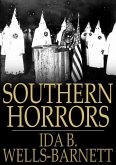The epidemic of lynching that gripped the American South in the decades after the Civil War and the end of slavery has been glossed over and understated in many history books. Activist Ida B. Wells took it upon herself to document this shameful practice and its prevalence throughout the region and, to a lesser extent, the entire country in a series of seminal volumes, including Southern Horrors.
Dieser Download kann aus rechtlichen Gründen nur mit Rechnungsadresse in A, B, BG, CY, CZ, D, DK, EW, E, FIN, F, GR, HR, H, IRL, I, LT, L, LR, M, NL, PL, P, R, S, SLO, SK ausgeliefert werden.









